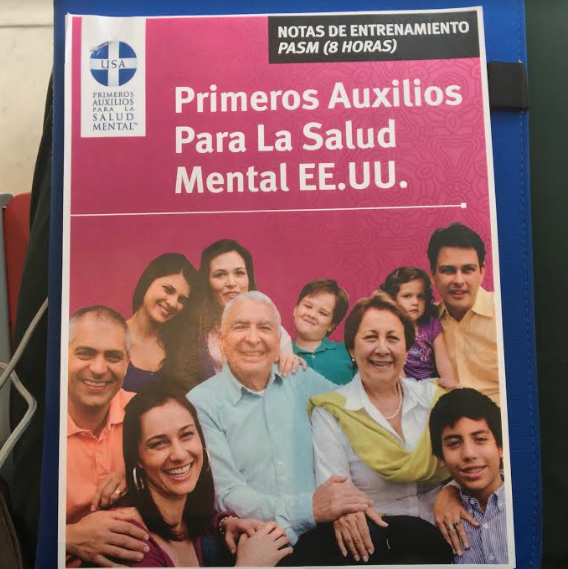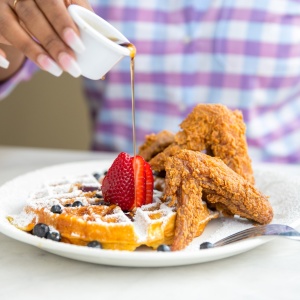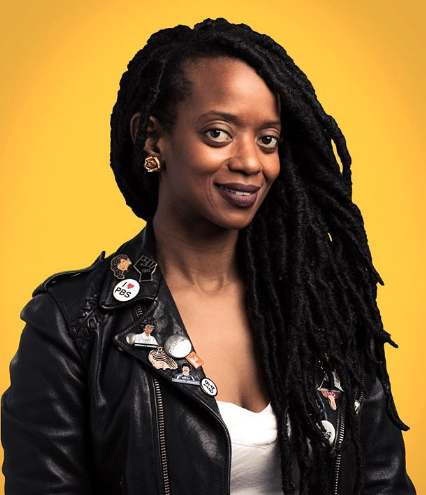How to be Black and mentally ill when news of Black death is everywhere.
I am black and I have complex Post Traumatic Stress Disorder (c.PTSD). My blackness intersects with my history of trauma and current mental illnesses in very specific ways. One of the ways in which they intersect is through the constant news of another black person being murdered or “turning up dead” or being brutalized or traumatized every day. Some people say that it’s once every eight hours, others say it’s once every 28 hours, but with extreme frequency a black person is murdered by someone in service of or protected by the United States of America.
Whether Black folks are diagnosed as mentally ill or not, this constant news of death and destruction is affecting us. For example, the suicide rate for black youth has nearly doubled while that of other children has gone down. We are experiencing genocide both mentally and physically so I want to offer some tips that are helping me to process my pain while still doing what I need to do to survive in America.
- Recognize that what we are experiencing is genocide. Naming it and dealing with the reality of our experiences is so important. Don’t gaslight yourself or allow others to gaslight you. The issue is not a bunch of people making mistakes, the issue is systemic.
- Learn about the people who came before you. The genocide we are experiencing is not new. We have been here dealing with the same kinds of trauma at the hands of white folks since before we even came to America. Situating our experiences in the context of those who came before us is helpful because for me at least it’s inspiring. When I think about Harriet Tubman or Toussaint L’Ouverture or Amilcar Cabral I am reminded that I come from very strong people. Someone once told me we do a disservice to those who come before us when we feel hopeless (about our ability to free ourselves from enslavement and white supremacy) today and it’s true. If Toussaint could free a country from the slavery and French rule then we can free ourselves from white supremacy.
- It’s especially important to teach the children about the people who came before them as well. Find kid friendly stories about our history and let the children know where they came from early.
- Find or create community. The kyriarchy, or the intersecting systems of oppression that is at the root of systemic black death, thrives when we are isolated. Find like minded people irl or online and build community with them. Eat dinner with them. Go to a park. Black love, romantic or otherwise is so healing and important. And talking about your feelings and processing in a group us very healing. Especially if you can not access quality mental health services.
- Make sure you eat frequently and drink water. Stretch. Wash your face. Be gentle with yourself, the world around us is already so rough. We don’t need to add to it. If possible go outside in nature, or in your community. Remind yourself that black people have survived so much before this and that we as a whole will survive this too.
- Work in your communities to fight back, in every way you can. What skills or resources do you have to offer to the people who are our modern day Harriet’s and Amilcar’s and Toussaint’s? Find these organizations that are genuinely about black liberation and help in whatever way you can. Maybe you aren’t able to do direct action or face arrest but if you can cook for a meeting or provide books and diapers to help the young parents and child care providers then you are already helping so much.
- Grieve. You should cry or be angry if you feel like crying or being angry. Black folks as a whole We are taught from birth to police our emotions to the point where a lot of us can’t even feel them anymore. Connect with the part of you that is hurting and let it hurt. Emotions are human and we are not robots. We are more than dancing and singing and athletic machines that can take all matter of abuse and keep churning out culture for the mainstream to commodify. We are allowed to grieve.
- Partake in black culture. Listen to black music. Read black books and view black art. We deserve to be happy too.
The struggle is real but we are survivors. Please take your time and do what you need to do to make sure you and your family is okay. These are some simple things that work for me, and I hope they can also help you if you are reading this. Let me know in the comments of anything that helps you in times like these. What music or art or book or historical figure gives you hope?
Have You Heard Of 'Racial Crossfit'? Try This Summer Workout
On Taking Mental Health Days
In many black families the only conversations had about mental health are centered on that one uncle everyone swears was perfectly “normal” until a friend gave him some “bad stuff” in college twenty years ago. Although circumstances surrounding this "situation" are vague there is an unspoken understanding amongst family members that everyone handles “Unc” with kid gloves.
More importantly it is known that nobody, nowhere, at no time is to mention any of the details surrounding said uncle's bad weed (?) experience.
Growing up in my poor Black Midwest family, these very real circumstances were barely discussed, and when they were, rarely did anyone use technical terms or point to the very real and present examples. When anyone mentioned therapy or burnout it was regularly dismissed and filed away under White People Shit. My only example of self–care was when the phone would ring and my mama would say, “I don’t care who it is, I ain’t here.” I wouldn’t say that this was the best form of self-care but it was the 90’s, she was a single mother raising four kids working two jobs—It be like that!
I knew back in high school that I was suffering with depression pretty badly; I had days where I literally could not get out of bed, and I contemplated suicide on multiple occasions. Although I was struggling to get through my day to day life and considering putting an end to it, nobody knew. I was taught at an early age that no matter what was going on, always live by the ancient Wakandan Proverb: “Fake it ‘til you make it!” I did and I did it well.
I lived this way well into my 20's. At 21 years old I was working 60 hour work weeks running an after-school program, and juggling life as the primary caretaker of my 6 year old nephew who was staying with me at the time. On the outside people thought I had my shit together, but in reality I had no balance and my life was a mess. My wife (then just a friend) warned me that I needed to take care of myself. Clearly this life I was living was not sustainable, and she feared if I took on anything else I’d break.
One day after a series of unfortunate events I was forced to move from my apartment and had nowhere to go. It was an ice cold rainy day in February. Most of my clothes and some of my furniture were ruined. It was a mess. I recall standing frozen in the pouring rain, thinking, “This is rock bottom. I’m done living.” I heard a neighbor asking if I was okay. I immediately snapped back to reality and responded, “Sure.” Remembering that old proverb, I held it all together, rented a truck, mustered up Hulk-like strength, and moved my entire two-bedroom apartment into a storage unit by myself.
When I was done I sat and stared at the ground for a whole hour before I called my friend, Jazz (now wife) to tell her what happened. Within 30 minutes, she and my homeboy both offered me space at their apartments. That night, both of them laid on the floor with me, and gave me permission to just be, and to feel whatever I needed; I sobbed uncontrollably for hours before falling asleep.
The next morning I woke up and started getting ready for work, and I heard Jazz’s voice yell from the other room, “What do you think you’re doing?!?” I explained I was headed to work.
“Oh hell nah, you’re taking a Mental Health Day.”
I had never heard this term before then. She explained to me that I needed to take a day detached from my stressors and worries, focusing on recharging and reenergizing. First I thought she was crazy, but then I realized that was exactly what I needed.
After I took my first Mental Health Day, I noticed immediately how refreshed I felt, and how detaching for 24 hours allowed me to focus on life, regain my positivity, and center myself.
Taking a Mental Health day allowed me to approach my life (bullshit included) with a sense of control and stability that my stress and depression took from me.
Fast forward 9 years I am now married with two kids. Not only am I still taking Mental Health Days, but the rest of the family is too. They have become of our family’s wellness plan. There are unscheduled days throughout the year when we each take the time we need. There are all also days when the whole family needs these days together to regroup and focus our energy, and watch all the Harry Potter Movies. Right now Mental Health days are only offered to my Wife and the the ActionFigure (my 12 year old son). My 2 year old daughter, The MiniFigure?
Oh, her ass is the reason we need so many, so she goes to daycare whenever it's open!
I used to feel guilty. I would be nervous calling my boss to request the time off. I would lie and tell The ActionFigure’s teachers he had to go to the Orthodontist (lil' nigga ain’t even got braces). I even tried to keep these days a secret, cause God forbid grandparents got wind that the kid missed school for “no good reason.” We would have to hear a speech about how crazy “these millennials” are with this “newfangled parenting.”
Finally, I said I don’t give a shit. I value our mental health and well-being over what folks think. I don't worry anymore about what I'll tell my job because for me to do my best I need to be at my best. If I'm honest, I'd have to say employers are overdue on writing mental health into sick leave situations. In the meantime, what do I look like hoarding my sick/vacation time knowing Susie from accounting just took a week off to get her dog cataract surgery?!? Mental Health Days are so crucial to my overall wellness and success, that I’m not letting anyone or anything stand in the way of me taking these days to get my mind right.
Also from today: Mental Health Monday #23: Ways to beat anxiety, healing via apps, Isaiah Rashad on depression, etc.
Do you have an event, article, story, video, or resource we should know about? Don't be shy, hit us up.
Before retiring to his life as Husband and father of two, Jamond Coaston-Foree was a theatrical performer, director and costume designer. He now works in the Youth Development Non-Profit world, teaching the children of our future well, and letting them lead the way. Not at all competitive, he is the absolute best at talking shit. He is a well decorated fried chicken connoisseur, and enjoys singing show tunes when everyone else is quiet.
Mental Health Monday #23: Ways to beat anxiety, healing via apps, Isaiah Rashad on depression, etc.
Rapper Isaiah Rashad (photo: Genius)
Welcome to another round of Mental Health Monday, your weekly dose of stories, resources, and motivation for your everyday life. On last week's Mental Health Monday, we covered vanity as a form of self-care, ways to calm anxiety, a story from a woman who hates therapy. and Black celebs who've been public with their mental and emotional challenges. Check it out here.
Also today on Mental Health Monday: "On Taking Mental Health Days" by Jamond Coaston-Foree
TODAY'S GOODNESS
"Why Black Men Need To Speak Out About Depression" by Lenox Magee [SlayTV]
Dr. David Malebranche reported to Newsone.com that, an internist and primary care physician at the University of Pennsylvania, has treated the issue of depression among Black men and agrees that it is largely under diagnosed and that’s because so many of us won’t open up about our feelings.
"Don’t Forget To Check On Your Strong Friend" by Kiara Imani Williams, Esq. [HuffPost]
When is the last time you checked on your strong friend? Your parents? Your mentor? Your pastor? Your life coach? Your professor? The people in your life fill two distinct roles ― fruit pickers and fertilizers. Fruit pickers require you to give of yourself. Fertilizers renew your spirits.
"Isaiah Rashad Speaks On Mental Health: “Don’t Go Through The Problems In Your Head Alone”" by Michelle Kim [Fader]
"Don't go through the problems in your head alone," Rashad writes. "There's nothing wrong with asking for help. The worst thing to do is think ur alone in it."
What if we talked about mental health the same way we talked about the rest of our body?
"Genuinely helpful tips for dealing with anxiety I’ve learnt through CBT" by Ellen Scott [Metro UK]
3. Ask yourself how you’d talk to a friend in the same situation
Anxious people tend to be hard on themselves.
We tell ourselves we’re sh*t, we catastrophise, and we never give ourselves the same level on understanding we’d give a friend.
When you’re facing a problem or your brain’s telling you nasty stuff, ask yourself how you’d respond if a friend was saying what your mind is telling you.
"Could an APP help fight depression? World's first mental health chatbot decreases symptoms two times faster than traditional therapy" [Daily Mail]
It runs through Facebook Messenger, and acts as a personal therapist to help address users' mental health challenges, including depression and anxiety.
Within the chat, Woebot uses artificial intelligence to create natural, personalised and human-like conversations and offer emotional support to users.
"Pikangikum First Nation Suicide Crisis Prompts Funding For 20 Mental Health Workers"
Ontario Health Minister Eric Hoskins is announcing funding for 20 full-time mental health workers for Pikangikum First Nation — a remote community struggling with a suicide crisis and pressing mental health needs from about 380 people seeking counselling.
The mental health workers will be going to the reserve, located near the Ontario and Manitoba border, immediately at a cost of about $1.6 million dollars, Hoskins said.
"Mental Illness Is Far More Common Than We Knew" by Aaron Reuben, Jonathan Schaefer [Scientific American]
We found that if you follow people over time, and screen them regularly using simple, evidence-based tools, the percentage of people who develop a diagnosable mental illness at any point in their lives jumps to well over 80 percent. In our cohort only 17 percent of study members did not develop a disorder, at least briefly, by middle age. Because we can’t be certain these individuals remained disorder-free in the years between assessments, the true proportion that never experienced a mental illness may be even smaller.
Are you a Black mental health professional? Do you know one? Alex is building a hub for Black wellness. Learn how you can be down.
Do you have a mental health-related story, video, event, or other content we should know about? Hit us up.
Why Isn't It Taken Seriously When Men Prey On Our Children?
That time Jay stopped by The Cinema Bun Podcast to discuss "War For The Planet Of The Apes"
Mike Vick Loses His Invite To The BBQ Over Kaepernick's Afro
Mike Vick, for better or worse, is a vindicated man. His rise and fall was so meteoric that many of my people (black people) were thrown off. All of it over dog fighting. Rather than wallow in his guilt, Vick decided to serve his time, get back into the league, and perform. And that is what he did until he retired recently. With his debts repaid to society (and his debt collectors), Vick is the poster child of NFL redemption.
But now, it seems that he is losing some of his common sense. Either that or he lost it on his climb back into society’s good graces.
The sad part is that the interviews were, minus the malarkey, pretty good. He spoke on Ezekiel Elliot and making sure that athletes focus on the game. He was dropping some gems about representation and being a team player. Hell, the conversation delved into the issues of excess. With that said, Mike Vick spread a lot of his wisdom through his words.
And as quick as Vick sparked that comeback against the Giants on Week 15 back in 2010, he found a way to throw all that excellent commentary out of the window.
When the topic was brought up about Colin Kaepernick, Mike Vick did the worst thing he could do: he caped for the NFL ownership. He suggested that “it has nothing to do with being blackballed” and “Colin didn’t have the best two years the last two seasons.” In a separate interview on “Speak For Yourself,” Vick noted that Colin Kaepernick needs to cut his hair:
First thing we’ve got to get Colin to do is cut his hair. Listen, I’m not up here to try to be politically correct. Even if he puts cornrows in there. I don’t think he should represent himself in that way in terms of just the hairstyle. Just go clean-cut. You know, why not? You’re already dealing with a lot of controversy surrounding this issue. The most important thing that he needs to do is just try to be presentable. [1]
I don’t know about anyone else, but Mike Vick gave some unsurprisingly bad advice.
MIKE VICK COOK'S OUT INVITE RESCINDED
None of this can surprise me because Mike Vick is an ex-con that is basically redeemed within the conscious of the NFL. When a person is coming from imprisonment and wants to get back into society, he/she will “clean up their image.” He/she will go for an easily manageable, unnoticeable hairstyle. He/She will talk in a way that shows remorse and humility. That person will, without a shadow of a doubt, do whatever it takes to look “safe” to others.
The problem with the “safe” approach is that Colin Kaepernick isn’t an ex-con; he is a man that took a stance that people didn’t like. His image isn’t based on any illegal action he had taken. Kaepernick, by far and wide, has been a model citizen. In fact, his efforts towards social activism should be modeled and applauded. It is sad that a man that is doing everything for the people is being viewed as a felon.
Also, the idea that Kaepernick had some off years in his last two seasons is off. His completion percentage stayed at 59%, while his best year was 62%. He had a rating of 90.7 in 2016 but his highest year was at 98.3 and his second-best year at 91.6. He passed for 16 touchdowns and ran for 4 in 2016 while his highest (21 pass, 4 run) was in 2013. In short, Kapernick’s production wasn’t off; the 49ers sucked.
MIKE VICK CAN EAT AT GOLDEN CORRAL
It is sad when you see one of Black America’s favorite athletes cape for NFL owners. Then again, this is what you do when you are an ex-con trying to be on the good side of ownership. Mike Vick has every right to his opinion. However, just because it is an opinion doesn’t mean that Vick’s sentiments aren’t dead wrong. To be frank, none of what he said made any realistic sense. Just goes to show how the mind works when you want to be redeemed by the powers that be.
I have his gift card to Golden Corral ready for him. He can eat at the buffet.



































